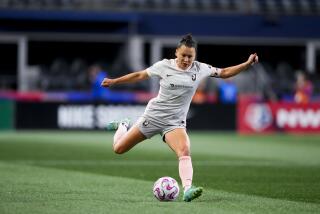Lingle plays through the pain
- Share via
She still has bad days. On Fridays, Lauren Lingle takes the medicine that is supposed to protect her from own body. On Saturdays, she may throw up a half-dozen times before she slips into the pool to play water polo. It is her sport of choice, but is as much her therapy.
Lingle, 17, suffers from rheumatoid arthritis. She once was laid up for six weeks in a hospital bed because of stiffness, once could get around only in a wheelchair. Her bones are creaky and the index and middle fingers on both her hands arch backward, unnaturally, like someone’s decades older.
But she actually starts for the varsity at Fountain Valley High.
Her performance in the face of real-life adversity -- not the kind found on an athletic field -- was a reason she was chosen to ride on the float of her healthcare provider, Kaiser Permanente, in the Rose Parade last week.
She cannot escape the throbbing pain, which is worse in the winter. “I have it in every joint, pretty much from my neck and first vertebra down to my fingers and toes,” Lingle said.
But with the pain came a maturity for the oldest of Lisa Lingle’s two daughters.
“I’ve learned to be grateful for what you have,” said Lauren, who plays the driver position and excels on defense for the Barons. “If you think you can do it, try it. Just because someone says no doesn’t mean that’s the end of it.”
Had Lingle given up when she was diagnosed with juvenile rheumatoid arthritis, she would never have jumped head-first into a sport that exacts such a physical toll as water polo.
“The swimming alone . . . “ Coach Jeff Russ said. “All the yards we do, you have to tread water for a whole game, and girls are grabbing your suit, punching and kicking you.”
Had she given in to her disease, Lingle and her best friend, Alyssa Morris, would never have founded Kids Helping Kids, an on-campus club that teaches students about diseases. It also raises money and goods for donation.
The Arthritis Foundation has asked Lingle to be a national spokesperson for juvenile rheumatoid arthritis, an autoimmune disease characterized by the inflammation of the lining of the joints and, at its worst, a release of enzymes that may digest bone and cartilage, affect internal organs and cause loss of movement.
About 300,000 children in the U.S. have some form of arthritis, and about 50,000 are affected by JRA.
Lingle was 11 when she got sick about three weeks after attending an outdoor camp. She was unable to keep any food down, her joints swelled and, already afflicted with asthma, she was having “incredible chest pains,” her mother recalled.
After five days in the hospital, Lingle was diagnosed with JRA and about a year later she was diagnosed with fibromyalgia, which is widespread pain in the muscles, ligaments and tendons, as well as fatigue. She had to be home-schooled, missing most of the next three months of fifth grade.
Lingle’s condition flared again after a minor traffic accident in the summer of 2004. Combined with the stress of starting high school that fall her condition “started to go downhill,” her mother recalled.
A few months later, on Jan. 15, Lingle awoke but couldn’t get out of bed. She spent the next five days in the hospital, the next two months in home health care, and the next 5 1/2 weeks at Miller Children’s Hospital in Long Beach.
At one point, she was taking 362 pills or shots a week. She had to learn to walk again, and her condition was so severe that the Make-a-Wish Foundation granted her a Hawaiian vacation.
Hydrotherapy -- swimming -- had been part of her rehabilitation. Watching younger sister Rachel play water polo, Lingle told her mom she wanted to try too.
“She looked at me like I was crazy,” said Lingle, who had given up club soccer when she was initially diagnosed. “I was missing something. There was definitely a void. I wanted to do something to be active. I was tired of swimming.”
Fearing for her daughter’s safety and looking for a reason to say no, Lisa sought second and third opinions from doctors and therapists. They said to let her try it if that’s what she wanted.
Russ agreed to let Lingle be part of the team, but really all he was allowing her was pool time. Yet, in the water, her limbs loosened up. After a while, she was no longer just doing eggbeaters, but was a real participant. By season’s end, she had scored a goal in a frosh-soph game.
In Lingle’s junior year, she made the varsity. This season, she’s a starter, shining on defense.
“On a daily basis, she rises above all that pain and discomfort. She has never given in to that,” Russ said. “She doesn’t miss practice. From a wheelchair to this in two years. Amazing.”
Said Lingle, who hopes to play in college and study education or medicine: “I love this 10 times more than soccer.”
Lisa Lingle is still brought to tears when she considers her daughter’s ordeal, and she never misses a game. But she is equally proud of what she has accomplished outside the pool.
“Definitely, raising awareness is important, giving back to people,” Lauren said. “I learned people do care, and there is help out there.”
--


